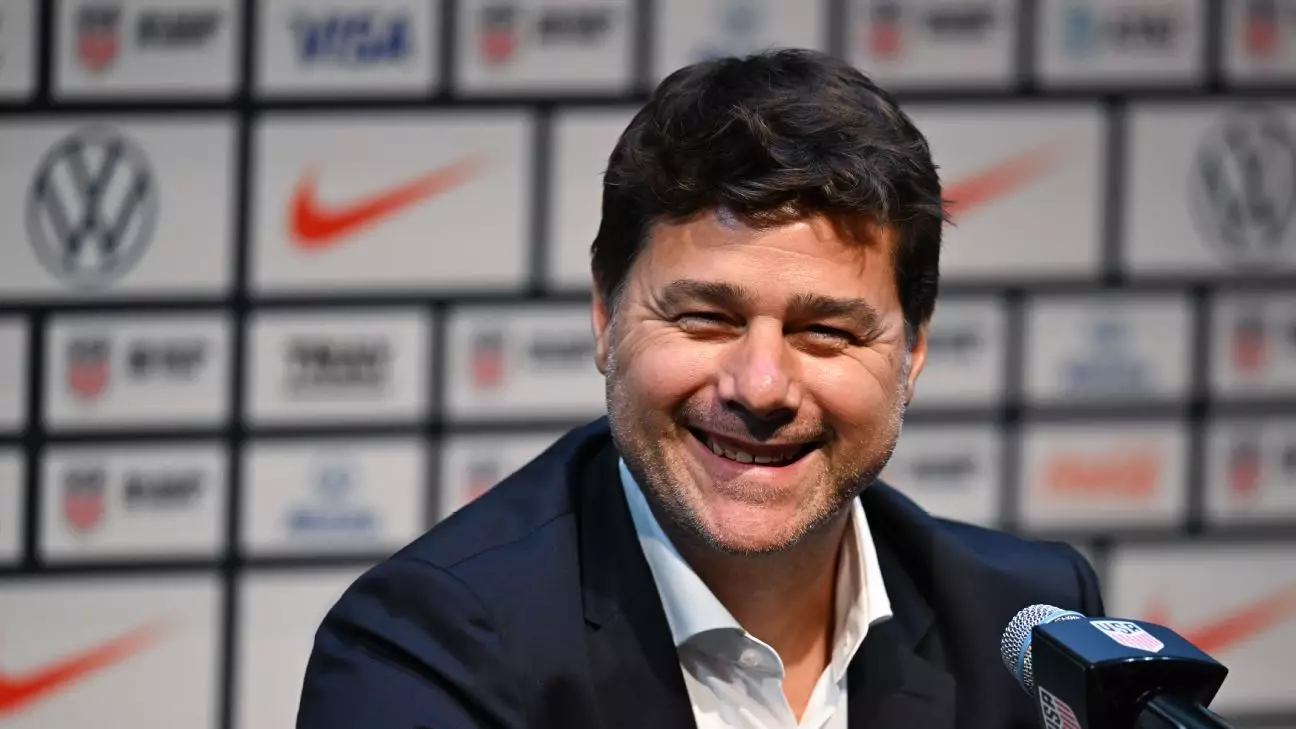The recent appointment of Mauricio Pochettino as head coach of the U.S. men’s national soccer team has sparked a wave of optimism among players and fans alike. Chris Richards, a defender currently playing for Crystal Palace in the English Premier League, encapsulated this sentiment perfectly when he expressed that hiring such a prominent figure is indicative of U.S. Soccer’s serious ambition to elevate the sport. The choice to enlist an internationally acclaimed coach rather than opting for a more conventional or locally bred alternative underscores a vibrant transformation in U.S. soccer’s approach to development and competition.
Richards noted that Pochettino’s impressive track record in club football stands as a solid foundation upon which he can build the national team. This decision seems to be more than a mere tactical choice; it’s a bold statement about U.S. Soccer’s intent to push boundaries and expand the game’s reach in America. “Hiring a manager like Pochettino shows that you’re serious about growing the game,” Richards commented, emphasizing that the national team’s ambitions are matching the growing enthusiasm for soccer in a country often overshadowed by its more traditional sports.
Ambitions for the Future
Looking forward to the 2026 FIFA World Cup, which will be co-hosted by the U.S., Canada, and Mexico, there’s an increasing anticipation surrounding how the team’s performance may evolve under Pochettino. Richards boldly stated, “I want to win it,” as he addressed the crucial question of the potential success for the U.S. in the upcoming tournament. This mindset reflects not only his personal aspirations but also a broader, collective hope that the U.S. men’s national team can transition from a secondary player in the soccer world to a strong contender for major titles.
The shift in culture can be traced back to a generation of players who grew up idolizing global soccer icons and are now in positions to realize those dreams. Richards, alongside fellow teammates, is part of a larger movement that aims to channel this energy and enthusiasm into tangible success on the pitch. Pochettino’s influence is expected to instill a professional rigor and tactical sophistication that have been essential to his prior successes in Europe.
While the ambitions of the U.S. soccer team are clear, Richards also identified critical barriers that currently hinder the growth of the sport at the grassroots level. He brought to attention the pervasive “pay-to-play” model that still dominates youth soccer in the United States. This system limits opportunities for talented athletes who might lack the financial resources to participate, thereby creating an uneven playing field that undermines inclusion.
“Football is the quickest growing sport in the U.S.,” he remarked, however, this growth potential is not fully realized due to economic barriers. Making the sport accessible without financial burden is vital for nurturing talent and expanding participation. Richards expressed hope that the upcoming World Cup would serve as a catalyst to create changes that would make soccer more accessible to all. A future model that eliminates the “pay-to-play” element could lead to a more diverse and talented pool of players emerging from all backgrounds, thus enriching the national team.
As the national team gears up for matches against Panama and Mexico under Pochettino’s leadership, there are personal stories intertwined within the team’s narrative. Tyler Adams, the U.S. captain currently at Bournemouth, is on the brink of returning after recovering from back surgery. His journey highlights the importance of resilience in sport, not just for individual players but for the team as a whole.
Manager Andoni Iraola provided updates on Adams, noting his dedication to training and readiness for upcoming matches. Adams missed significant time due to injuries last season and is now aiming to reclaim his place just as the national team embarks on a new chapter. His resilience serves both as an inspiration and a reminder of the challenges that can beset athletes at any stage of their career.
The hiring of Pochettino marks a pivotal moment for U.S. Soccer’s future. Richards embodies the optimism and ambitious spirit that many players and fans share as they transition into this era of potential. The combination of aiming for lofty goals on the international stage while simultaneously addressing systemic issues within the sport can propel U.S. Soccer into an exciting future.
With world-class management at the helm and a growing pool of talented players eager to compete on the global stage, there’s a prevailing sense that U.S. Soccer is not just participating but is resolutely determined to excel. For players like Richards and Adams, the objectives are crystal clear: they are ready to leave their mark on the beautiful game.

